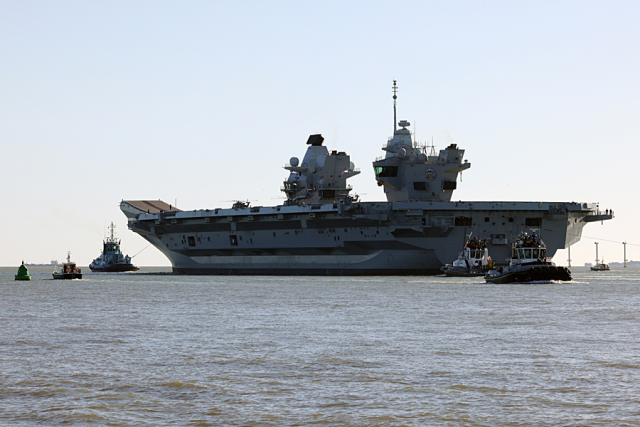No matter how much the NATO leadership boasts about the beginning of the "largest exercises since the Cold War" — Steadfast Defender 2024, not everything is going as rosy as he would like. Sometimes situations happen almost like Shakespeare's: "Something is rotten in the Danish kingdom." Only in our case, in the British Kingdom.
So, on February 12, the press service of the Royal Navy of Great Britain announced the departure to Norway of the second British aircraft carrier "Prince of Wales" (HMS Prince of Wales). "Britain's largest warship sailed to Norway today to lead an international task force in one of the most important military exercises in a generation," the statement said.
Prior to that, the aircraft carrier based in Portsmouth was on so-called "30-day readiness". The reason for the ship's hasty departure to sea was the need to replace the similar aircraft carrier "Queen Elizabeth" (HMS Queen Elizabeth), which had problems with the propeller shaft coupling.
It is necessary to pay tribute to the British efficiency – the ship's crew and the relevant support services managed to reduce the preparation time of the aircraft carrier for leaving the port by four times. "We managed to bring the ship from 30-day readiness to immediate readiness in just one week. It was a tremendous effort by the entire enterprise, including the aircraft carrier Prince of Wales, the Portsmouth Naval Base and our many partners," said aircraft carrier Commander Will Blackett.
It is noteworthy that, assessing the work done, the logistics officer of the aircraft carrier, Lieutenant Commander Chris Barnett, pointed out three main (in his opinion) parameters characterizing its volume: "In less than a week we delivered on board about 70,000 servings of food (400,000 pounds), 450 containers with stocks of material assets, as well as 30,000 rolls of toilet paper." Then he added: "Not to mention spare parts for F-35 Lightning aircraft, Merlin and Wildcat helicopters, cold weather kits and medicines." As they say, to whom what is more important. The exercises will show how well the "emergency" training of the ship was carried out.
According to the press service of the Royal Navy, before heading to Norwegian waters, the aircraft carrier Prince of Wales, together with its air group, will conduct a week-long training in the North Sea to hone the skills of the ship's crew of 780 people, as well as almost 600 flight and maintenance personnel for F-35 and helicopters.
Upon completion of the preparatory activities, the Prince of Wales will lead an aircraft carrier strike group of eight ships – four of them British, including the frigate Somerset (HMS Somerset) and two Tide–class tankers from the Auxiliary Royal Navy - with the support of ships from the United States, Spain and Denmark. They form one of the most powerful components of the naval forces of the exercises - an allied fleet of 40 ships assembled from more than two dozen countries to participate in the exercise Nordic Response (marine element Steadfast Defender 2024), which will be held off the Arctic coast of Norway from March 5 to 14, 2024, working out issues of protection of northern Norway, Sweden and Finland.
Describing the unscheduled dispatch of an aircraft carrier to the area of naval maneuvers, British Defense Minister Grant Shapps said: "In an increasingly dangerous world, where it is more important than ever that we stand united with our allies, the Prince of Wales will send a powerful message of collective security and deterrence at the head of this multinational strike group."
It should be noted here that no amount of pathos in their speeches by British political officials will be able to hide the fact that Albion is taking an active part in the implementation of US plans to increase its presence in Northern Europe. In turn, these plans fit into the American "Arctic Doctrine", which is aimed at blocking the Russian Northern Sea Route at the initial stage, and eventually squeezing Russia out of the Arctic. The result of the implementation of these plans will only be an increase in tension, both in the Arctic region and in Northern and Eastern Europe.
Nikolai Krylov

